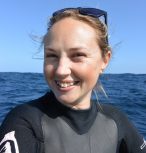DNA reveals the past and future of coral reefs
New DNA techniques are being used to understand how coral reacted to the end of the last ice age in order to better predict how they will cope with current changes to the climate. James Cook Univer

From 2005 to 2022, the main node of the ARC Centre of Excellence for Coral Reef Studies was headquartered at James Cook University in Townsville, Queensland (Australia)








Abstract. Climate change is expected to significantly threaten coral reefs and their organisms globally. Precise predictions of biological impacts are essential for effective management. In the short-term (e.g. days to weeks), elevated water temperature negatively affects coral reef fishes’ physiology, life history, and behaviour. However, there remains a lack of knowledge regarding the capacity for coral reef fishes to adjust to climate change in the long-term (e.g. over generations) through evolutionary processes. My PhD project will employ an experimental approach to predict the influence of phenotypic plasticity and genetic adaptation on a coral reef fish’s ability to persist through global warming.
Biography. Rachel is a PhD candidate at James Cook University, studying the capacity of coral reef fishes to adjust to climate change, under the guidance of Prof. Philip Munday and Dr Jennifer Donelson. Rachel completed her Bachelor of marine science at Macquarie University in Sydney. She then undertook a Masters in evolutionary biology at the University of Basel in Switzerland, where she studied the infamous adaptive radiation of African cichlid fishes. After spending time working as a marine ecologist for an NGO in South Africa, she returned to Australia to embark on a PhD at the Centre of Excellence.
New DNA techniques are being used to understand how coral reacted to the end of the last ice age in order to better predict how they will cope with current changes to the climate. James Cook Univer
A new study on the effects of climate change in five tropical countries has found fisheries are in more trouble than agriculture, and poor people are in the most danger. Distinguished Profess
James Cook University researchers have found brightly coloured fish are becoming increasingly rare as coral declines, with the phenomenon likely to get worse in the future. Christopher Hemingson, a
Researchers working with stakeholders in the Great Barrier Reef region have come up with ideas on how groups responsible for looking after the reef can operate more effectively when the next bleaching
Abstract: As marine species adapt to climate change, their heat tolerance will likely be under strong selection. Individual variation in heat tolerance and its heritability underpin the potential fo
Abstract: The Reef Ecology Lab in KAUST’s Red Sea Research Center explores many aspects of movement ecology of marine organisms, ranging from adult migrations to intergenerational larval dispersal
Abstract: Macroalgal meadows are a prominent, yet often maligned component of the tropical seascape. Our work at Ningaloo reef in WA demonstrate that canopy forming macroalgae provide habitat for ad
Abstract: Sharks are generally perceived as strong and fearsome animals. With fossils dating back at least 420 million years, sharks are not only majestic top predators but they also outlived dinosa
Abstract: Connectivity plays a vital role in many ecosystems through its effects on fundamental ecological and evolutionary processes. Its consequences for populations and metapopulations have been
Abstract: Evolution of many eukaryotic organisms is affected by interactions with microbes. Microbial symbioses can ultimately reflect host’s diet, habitat range, and even body shape. However, how
Abstract: The past few years have seen unprecedented coral bleaching and mortality on the Great Barrier Reef (GBR) but the consequences of this on biodiversity are not yet known. This talk will expl